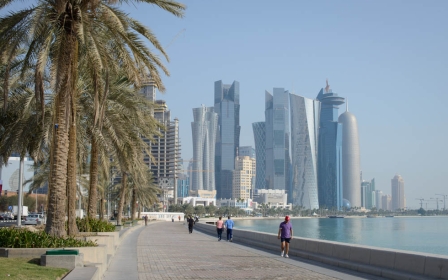Hague court ruling on Qatar blockade raises stakes for UAE

On 5 June 2017, Saudi Arabia, the United Arab Emirates, Bahrain and Egypt cut ties with Qatar, accusing it, among other things, of "supporting terrorism". The blockading countries expelled Qatari citizens and closed land, sea and air routes.
But Qatar remained unflinching, refuting the accusations and demonstrating a resilience that has withstood the new regional status quo for more than a year now.
Last month, Qatar filed a case at the International Court of Justice (ICJ) on the grounds that the UAE's discriminatory policies had led to ongoing human rights violations. Saudi Arabia, Bahrain and Egypt were left out because, unlike the UAE, they are not signatories to the International Convention on the Elimination of All Forms of Racial Discrimination.
Human rights violated
Qatar estimates that the blockade has significantly affected around 13,000 of its citizens, including hundreds of families who have been broken up. Among other things, Doha has denounced the UAE's unjustified expulsion of its citizens, ban on Qataris entering or transiting through the country, and discrimination against its students.
Various human rights groups have backed Qatar's case. In its ruling, the ICJ noted that "some of the acts of which Qatar complains may constitute acts of racial discrimination as defined by the Convention". The court cited several examples, including infringements on the right to education, the right to justice and the right to marry and choose a spouse.
The UAE has increasingly found itself the target of heavy international criticism because of its authoritarian regime and unwelcome intrusions into the various fault lines of the Middle East
The court called on the UAE to ensure that separated families are reunited. It also directed "that Qatari students affected by those measures are given the opportunity to complete their education in the UAE ... and that Qataris affected by those measures are allowed access to tribunals and other judicial organs of the UAE".
Abu Dhabi, for its part, released a statement contesting the allegations of discriminatory measures and suggesting it was "already in compliance" with the terms of the ruling. Qatar, meanwhile, welcomed the ruling, with a foreign ministry spokeswoman calling it "the first step on a long road to defend our rights".
Public outcry
Even if the ICJ ruling is not binding, its international resonance puts the UAE in a bad light for failing to meet international standards. It also comes amid a series of other episodes that have brought unprecedented embarrassment upon Abu Dhabi.
The UAE has increasingly found itself the target of heavy international criticism because of its authoritarian regime and unwelcome intrusions into the various fault lines of the Middle East. Amnesty International recently denounced the country over its management of secret prisons in southern Yemen, which are notorious for human rights violations.
The situation has prompted some countries to act. Norway has halted weapons exports to the UAE in condemnation of the war crimes in Yemen. In France, some MPs have called for a parliamentary inquiry into the sales of weapons and military equipment to Riyadh and Abu Dhabi.
Long shielded from criticism and regarded as a trendy tourist destination, the UAE is finally starting to suffer the international repercussions of its regional misconduct.
- Nabil Ennasri is a doctor of political science, an expert in Gulf politics, and the director of the Qatar Observatory. He is the author of L'Enigme du Qatar (Armand Colin). You can follow him on Twitter: @NabilEnnasri.
The views expressed in this article belong to the author and do not necessarily reflect the editorial policy of Middle East Eye.
Photo: Qatar’s delegation attends a hearing at the International Court of Justice
This article has been translated from the French version
Stay informed with MEE's newsletters
Sign up to get the latest alerts, insights and analysis, starting with Turkey Unpacked
Middle East Eye delivers independent and unrivalled coverage and analysis of the Middle East, North Africa and beyond. To learn more about republishing this content and the associated fees, please fill out this form. More about MEE can be found here.






